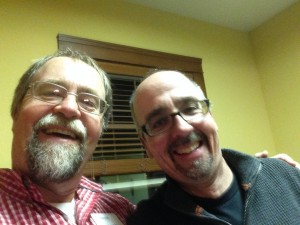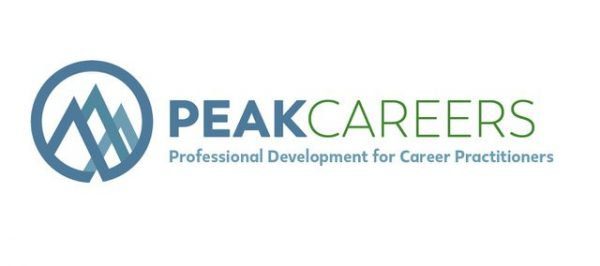My wife thinks I was crazy to register for a college class right now with all that I have to do. She’s right of course. But I could not stop myself from registering for my first MOOC* on the Science of Happiness. (*Massive Open Online Course.) UC-Berkeley stated that over 10,000 people had signed up. I can guarantee you there are not 10,000 in week 7. (I am in week 7, but the class is in week 8.)
Studying happiness with research and science to back it up has been wonderful. What has been more amazing is how intertwined this is with discovering your “purpose” in life. As a career coach or career counselor, here are three specific things you can do to help your students/clients to be happier and three things to think about in helping them discover purpose and meaning in their lives.
Research shows that happiness has a “set point” in all of us at about 50%. This means that we are born with a certain happiness set point that is not moveable. 10% of our happiness is our environment, where we live, with whom we live & work, etc.. This leaves a WHOPPING 40% that we actually have control over! Yahoo! Here are three action steps you can take to increase your happiness that I have learned in the class I do not have time for 🙂
1. Write in a ‘gratitude or positive journal.’ The research shows that you only have to do this for a week or so and the benefits of the exercise will carry over for months. At the end of each day write down three positive things that happened that day. They do not have to be big, anything you are grateful for or were positive activities. A couple of mine were “grateful to have my mother-in-law’s guitar to use” and “hung out with my wife at Maine’s organic fairground”. I have done this before when I was really struggling at work, and I was astounded at how my attitude changed to the positive. Clearly, I was happier after doing it for awhile.
2. Random acts of kindness. This was interesting. Research shows that if you do 5 acts of kindness in one day for four weeks, your happiness will go up. By doing all 5 in one day, it is more powerful in affecting change than if you did five random acts of kindness in a week. Just the idea that you have to be thoughtful on your chosen day to look for opportunities to do these acts of kindness makes the payoff better. Yep, it too works.
3. Being “mindful” and “in the moment” are very important to humans. With the speed of each day seemingly increasing for all of us, it is important to slow down and pay attention to the moment. You can do breathing exercises or meditation, but the key is to pay attention, REALLY pay attention to the moment you are in. If you pay attention to what is happening to you and you let your mind be “ok” with it, you naturally will stop rehashing the past or imagining negative thoughts in the future. Several studies have found that mindfulness increases positive emotions while reducing negative emotions and stress. (More info)
Here is my PechaKucha presentation titled “Take 10” about finding 10 minutes/day to slow down. PechaKucha is a 6-minute 40-second presentation format. http://vimeo.com/72040505
If you are happier, it is much easier to find your purpose. At the National Career Development Association Conference in June, Richard Leider, a leader on this topic, laid out three critical components of finding this purpose and helping others find their purpose.
1. The power of choice. He states the “people should choose to choose.” Think about it. We all have choices, but sometimes we get stuck in some place. We need to encourage people to choose to make a difference.
E.B. White said, “I arise in the morning torn between a desire to improve the world
and a desire to enjoy the world. This makes it hard to plan the day!
Help people take charge of their lives by nudging them to make choices in their lives.
2. Courage. People need the courage to look forward and to truly reflect on where they are now and where they want to go. Courage may take some nudging because it does NOT mean taking unnecessary risks but to look ahead and think about “what could be” and what action steps are necessary for getting there.
3. Curiosity. In our search for purpose, we need curiosity to explore our options and to have the discussions with people in our lives about what could be. Richard Leider talks about “unpacking” and “repacking” our bags. What IF I did this differently? What else is out there?
I will end my thinking here with a story and a challenge to you.
“Mark Twain told a wonderful story about one man’s search for the world’s greatest general. The man spent an entire lifetime looking for the general and finally the day came for him to travel on. When he arrived in heaven he walked over to St. Peter and said, ‘I’m looking for the world’s greatest general.’”
“St. Peter said, ‘I know, I know, we’ve been expecting you, and I have good news. If you’ll look right over there, you will see the world’s greatest general.’”
“The old man excitedly looked over and said, ‘That is not the world’s greatest general. That man was a cobbler on main street in my hometown!’”
“St. Peter responded, “But had he been a general, he would have been the greatest general ever.”
- Who are you working with now that could be YOUR General?
- Can you help your client/students be happier and discover their purpose?
- How can we help our students/clients find meaning in their lives?
Want to explore this topic further?
Check out my five-week online discussion-based seminar on Integrative Life Planning and helping others find meaning in their work.
Jim Peacock is the Principal at Peak-Careers Consulting and writes a monthly newsletter for career practitioners. Peak-Careers offers discussion-based online seminars for career practitioners focused on meeting continuing education needs for CCSP, GCDF and BCC certified professionals as well as workshops for career practitioners and individual career coaching.
Sign up here to receive my TOP 10 TIPS WHEN WORKING WITH AN UNDECIDED PERSON. You can also receive the career practitioners newsletter which includes a variety of career topics, industry news, interesting events, and more.





Great article!
Thanks Estelle,
I wasn’t sure I had expressed my thinking well or clear enough on this topic. So glad you enjoyed it.
Thanks for this article, Jim! I too was at the NCDA conference in June. I like the idea of linking positive psychology with career planning.
Would you say a bit about why you choose to include the Mark Twain story in the article? I am not sure that I understand how it fits…I am sure it does, I am just not clear.
Thanks!
Alison Angell
Lesley University
Alison,
Staying positive is a key element in career development and as career counselors / practitioners we need to help our students or clients stay positive by being happy. The Twain story connected for me that we as career counselors need to help all our clients stay positive and for us to be looking to ALL our clients hidden possibilities.
Sometimes we work with people who don’t “appear they can do what they want to do” (cobbler / general) and it is our job to help clients be happier and to help them discover their potential, which might very well be undiscovered.
Great post! I hope to take the same course!